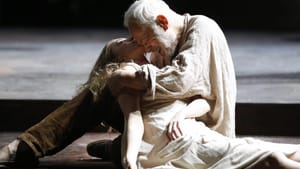Stay in the Loop
BSR publishes on a weekly schedule, with an email newsletter every Wednesday and Thursday morning. There’s no paywall, and subscribing is always free.
An unforgettable Lear and an exemplary life in the theater
Michael Pennington's Lear in Brooklyn

A few months ago, British actor Michael Pennington came to our shores to start rehearsing the role of a lifetime — King Lear — at the newly renovated Theatre for a New Audience. “Upon my arrival, I received a bit of a shock,” he confesses: he’s one of four Lears to pass through New York in a six-month period. (Frank Langella’s Lear had just departed from BAM, Simon Russell Beale’s Lear will be broadcast in high definition via National Theatre Live in May, and John Lithgow will perform Lear this summer at the Delacorte in the Park.)
Undaunted, Pennington is relishing the role he calls his destination. And we, in turn, are relishing his performance. “King Lear is like a cliff-face,” says the distinguished Shakespearean actor. “It’s a very physical part, requiring an inhuman amount of stamina night after night. I get tired washing the dishes or going to the local store, but I never get tired playing Lear.”
In contrast to Langella and Beale’s flamboyant performances, Pennington’s elegant, deeply felt Lear — Shakespeare’s most challenging tragic role — is a study in fallibility, vulnerability, and the dignity of a man in defeat. Unlike his predecessors, who rage through the first half of the play against their ungrateful daughters, Pennington’s Lear suffers the agonies of regret the minute he loses his temper in the first scene, leading him to disinherit Cordelia (his favorite), give his kingdom to his other two (destructive) daughters, and suffer the dire consequences. By the time the bereft and beleaguered Lear gets to the famous storm scene on the heath, stripped of everything, his speech (“Blow winds!”) is neither shouted nor ranted. Instead, it’s dredged up from the very depths of his anguished soul — until there’s nothing left. No wonder he goes mad.
Simple honesty
Performed on a bare stage in TFANA’s sleek black box, director Arin Arbus has delivered a stately, toned-down production that allows the beauty of Pennington’s honest performance to shine. In turn, Pennington does not tower over his cast, and they take his cue and deliver clearly etched performances (including Chris McCann’s touching Gloucester, Lilly Englert’s luminous Cordelia, Rachel Pickup’s cruel Goneril, and Bianco Amato’s conniving Regan).
I’ve seen a dozen Lears over the years (including Ian Holm, Tom Wilkinson, F. Murray Abraham, Oliver Ford Davies, Christopher Plummer, Ian McKellen, Kevin Kline, and Sam Waterston). But none match the clarity, simplicity, and humanity of Pennington’s. From him, I learned what the play is about. I always thought Lear was a tragedy of old age and a rage against loss — of status, of wealth, of one’s physical and mental faculties. But Pennington shows us that Lear is just as much the tragedy of a fractured family and the loss of a child. It’s also about seeking forgiveness. “Thou’ll come no more,” he says gently, cradling the dead Cordelia in his arms. “Never, never, never, never, never.” Pennington articulates that repetition — one of the toughest lines in Shakespeare — with such unadorned finality and humility that, hearing it, the heart of any parent in the audience would break.
As frail as he appears onstage, Pennington (almost 71) fairly glows offstage with the robust satisfaction of tackling the most challenging role of his career. The hardest part? “Having to exit through the audience house left, then turn around and crawl on all fours in the dark behind the last row so no one sees me, then reenter house right, carrying Cordelia. It’s wild!”
Always working
Pennington departs New York the day after his Lear ends — he’s on to his next project. He never stops working, because from the very beginning he’s taken control of his career. Now in his sixth decade with the Royal Shakespeare Company (as an Honorary Associate), he’s played literally dozens of roles, including a Hamlet (1981) that Guardian critic Michael Billington listed as one of the top ten in the last half-century. But that’s just a foundation for the independent work he’s generated for himself. In 1986 he cofounded the English Shakespeare Company, where he’s performed a dozen more Shakespearean roles (on one marathon weekend, he played seven different parts in Shakespeare’s seven-play “War of the Roses" Cycle). In addition, Pennington has written eight books, including three on Shakespeare, one of which (Sweet William) he performs as a one-man show.
So Pennington leaves us with the twin gifts of an unforgettable Lear and an exemplary life in the theater — one that should inspire our own American actors to follow suit and take their careers in their own hands. “If you’re a Shakespearean actor, you spend half your time denying that you are a Shakespearean actor,” Pennington explains. “It implies that you only do one thing. But Shakespeare is the final word on everything.”
What, When, Where
Shakespeare’s King Lear. Arin Arbus directed. Theatre for a New Audience, 262 Ashland Place, Brooklyn, playing through May 4. www.tfana.org.
Sign up for our newsletter
All of the week's new articles, all in one place. Sign up for the free weekly BSR newsletters, and don't miss a conversation.
